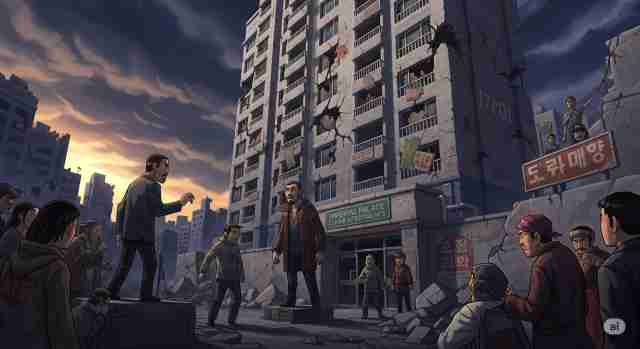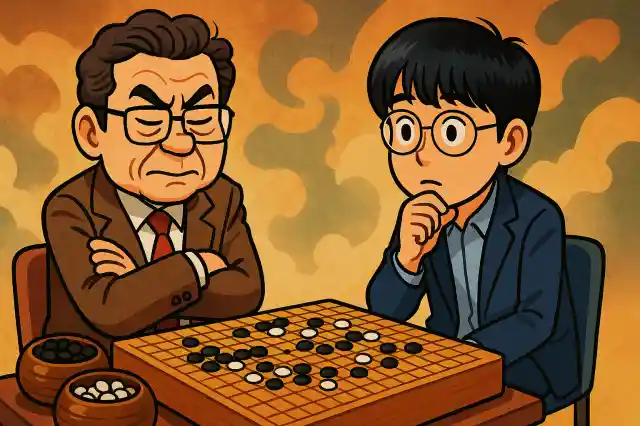Concrete Utopia: Korean Disaster Thriller
A Gripping Narrative and Social Commentary
Concrete Utopia, the most talked-about Korean film of the year, has captivated global audiences with its gripping narrative and profound social commentary. As the film continues to dominate box offices and streaming charts, it has become a benchmark in Korean cinema, redefining the disaster genre.
Key Takeaways:
- The film is set in a post-apocalyptic Seoul and follows the residents of the Imperial Palace Apartments.
- Concrete Utopia explores themes of survival, morality, and the fragility of utopia.
- The movie features standout performances from Lee Byung-hun, Park Seo-joon, and Park Bo-young.
- Critical Acclaim: The film has garnered widespread acclaim at major international film festivals and streaming platforms.
Table of Contents
- Concrete Utopia: Korean Disaster Thriller
- A Gripping Narrative and Social Commentary
- Introduction: A New Benchmark in Korean Cinema
- The Story: Survival, Morality, and the Fragility of Utopia
- Human Behavior Under Pressure: Realism and Empathy
- Social Commentary: A Mirror to Contemporary Anxieties
- Critical Acclaim and Global Impact
- Actionable Insights: What Concrete Utopia Teaches Us
- Conclusion: A Must-Watch for Global Audiences
Introduction: A New Benchmark in Korean Cinema
Concrete Utopia emerges as the most talked-about Korean film of the year, redefining the disaster genre with its gripping narrative and profound social commentary. Garnering widespread acclaim at major international film festivals and streaming platforms, this film is not just a cinematic spectacle but a thought-provoking exploration of human nature under crisis. Its selection as South Korea’s official submission for the Best International Feature at the Academy Awards and its dominance in box office and streaming charts underscore its global resonance.
The film’s success can be attributed to its compelling storyline, strong performances, and timely themes. As discussions about the film continue to thrive online and in critical circles, Concrete Utopia cements its place at the heart of the global conversation on disaster, humanity, and hope.
The Story: Survival, Morality, and the Fragility of Utopia
Set in a post-apocalyptic Seoul devastated by a catastrophic earthquake, Concrete Utopia follows the residents of the Imperial Palace Apartments—the sole building left standing amid a city reduced to rubble. As survivors flock to this lone sanctuary, the residents, led by the enigmatic Yeong-tak (Lee Byung-hun), must confront the harsh realities of survival: Who gets to stay? Who must be turned away? How far will they go to protect their fragile haven?
The narrative centers on Min-sung (Park Seo-joon) and his wife Myeong-hwa (Park Bo-young), whose moral convictions are tested as the apartment community grapples with mounting threats from both within and outside their walls. The film’s tension escalates as Yeong-tak enforces increasingly draconian rules, exposing the thin line between order and tyranny.
Human Behavior Under Pressure: Realism and Empathy
Concrete Utopia’s strength lies in its unflinching portrayal of human behavior when the veneer of normalcy is stripped away. The film draws from its webtoon origins, Cheerful Outcast, to present characters who are deeply flawed yet relatable, making their choices both understandable and heartbreaking. The audience witnesses acts of compassion and cruelty, loyalty and betrayal, highlighting the complexities of survival and the cost of maintaining a so-called utopia.
Lee Byung-hun’s performance as Yeong-tak is a standout, capturing the charisma and menace of a leader whose authority grows increasingly absolute. Park Seo-joon and Park Bo-young ground the story with emotional depth, embodying the everyday people thrust into extraordinary circumstances.
Social Commentary: A Mirror to Contemporary Anxieties
What sets Concrete Utopia apart is its incisive social commentary. Critics and fans alike interpret the film as a metaphor for pressing global concerns—climate change, crisis management, and social inequality. The apartment complex becomes a microcosm for society, where the struggle for resources and power echoes real-world debates about inclusion, privilege, and the ethics of survival.
The ambiguous ending, marked by unresolved moral dilemmas and the haunting aftermath of choices made, has fueled extensive discussions online. Threads on Reddit, Twitter/X, and YouTube dissect the film’s themes, drawing parallels to contemporary events and inviting viewers to question what they would do in similar circumstances.
Critical Acclaim and Global Impact
Concrete Utopia’s critical and popular momentum is undeniable. The film topped South Korea’s box office upon release and quickly became one of the most-watched Korean films on streaming platforms like Netflix and Viki. Social media metrics reveal a surge in English-language mentions, with high user ratings on Rotten Tomatoes and IMDb reflecting strong viewer engagement. Its Oscar campaign further amplified its international profile, sparking debate and analysis in English-language media and fan communities.
The film’s success is also bolstered by its presence at prestigious festivals such as the Toronto and Busan International Film Festivals, where it was lauded for both its technical prowess and emotional resonance. The ensemble cast’s performances, particularly Lee Byung-hun’s, have been widely praised, enhancing the global appeal of Korean acting talent.
Actionable Insights: What Concrete Utopia Teaches Us
- Empathy in Crisis: The film challenges viewers to consider the importance of empathy, even when survival is at stake.
- Leadership and Responsibility: Concrete Utopia serves as a cautionary tale about the dangers of unchecked authority and the ethical complexities of leadership during disasters.
- Social Cohesion vs. Exclusion: The apartment’s transformation from sanctuary to fortress mirrors real-world debates about community, solidarity, and the exclusion of outsiders during times of crisis.
- Art as Reflection: The film’s resonance with global anxieties highlights the power of cinema to foster dialogue about urgent social issues, making it not just entertainment but a catalyst for reflection and change.
Conclusion: A Must-Watch for Global Audiences
Concrete Utopia stands as a landmark in contemporary Korean cinema, blending blockbuster spectacle with nuanced social critique. Its international acclaim, compelling performances, and timely themes make it essential viewing for anyone interested in the intersection of entertainment and empathy. As discussions about the film continue to thrive online and in critical circles, Concrete Utopia cements its place at the heart of the global conversation on disaster, humanity, and hope.
For more in-depth reviews and story recaps, visit trusted sources such as The Review Geek, Wikipedia, RogerEbert.com, and The Asian Cinema Critic for comprehensive coverage and critical analysis of Concrete Utopia.
Related Articles:


